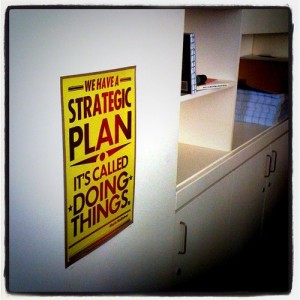A Plan is Not a Plan is Not a Plan
March 13, 2013 Leave a commentLast week I posted an entry on this blog about the myriad ways that people and organizations are engaged in “net work” for social change, by profiling three different initiatives focused on strengthening local food systems and food security. Not only is there a difference in the process, but there is also variation in terms of so-called ends or outcomes. The topic of “planning” has come up quite a bit in these networks and many questions asked about what “a plan” looks like in the context of multi-stakeholder/organizational initiatives tackling complex issues. Once again, the answer is that it depends. In both direct experiences at IISC and in additional research about other initiatives, there is a wide variety around what constitutes a plan for social change.
In looking at food initiatives alone, for example, we see everything from a very robust and detailed strategic plan (see Vermont Farm to Plate Network, a robust production/action network) to an overarching vision and supporting values (see Connecticut Food System Alliance – profiled in this lovely eNewsletter from CT NOFA Executive Director, Bill Duesing – which is at this point more of an alignment network), to other iterations. Something that stands out across these planning and alignment processes is a sentiment shared in this SSIR post by Dana O’Donovan of the Monitor Institute – “What is necessary today is a strategy that breaks free of static plans to be adaptive and directive, that emphasizes learning . . . and that reclaims the value of strategic thinking for the world that now surrounds us.” In other words, no matter what we generate we cannot become too wedded to it, or we risk losing ourselves in the map and distancing ourselves from the territory.
In another very helpful post, Jan Masaoka (formerly of CompassPoint) offers some thoughts about “Alternatives to Strategic Planning” along with the baseline advice that we consider: “What are the core questions we must unambiguously answer?” This might guide us to the living product that best serves us. Here are some other examples of what network planning might yield:
- Michigan Good Food Charter
- The New Mainstream: A Sustainable Food Agenda for California
- Rhode Island Food Assessment: Opportunities for Action
- Rhode Island Food Policy Council Vision and Goals
- Connecticut Right From the Start: Core Commitments, Vision, and Values
What else have you seen as helpful and innovative products to strategically guide for net work?
